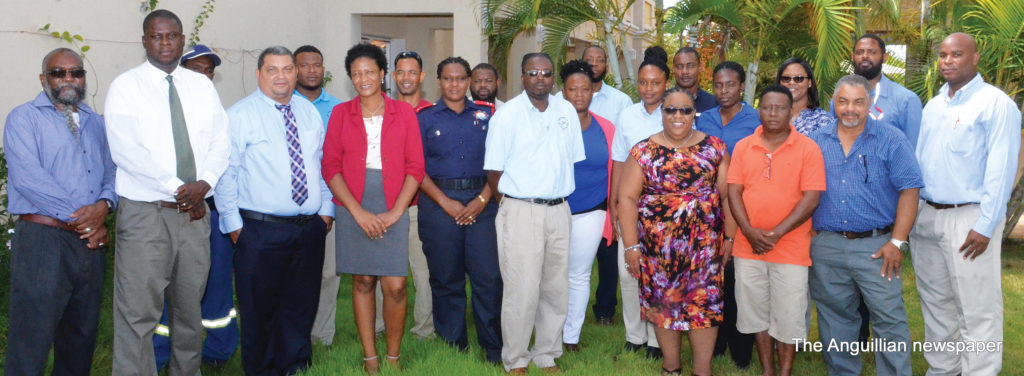
A workshop on air quality in homes and workplaces, particularly following hurricanes and other natural disasters – where mold or fungus, caused by damp environments can become a health problem – was held in Anguilla on Monday, July 8.
The one-day training workshop, titled “Indoor Air Quality”, was held at La Vue Conference Centre and was facilitated by Ms. Ermine Herman, Operational Manager of H&L Environmental Services in St. Lucia.
“Post Hurricane Irma, we have seen and heard about many workplaces and homes that were impacted by mold. It is time for us to act together now to deal with this matter,” Mr. Alwyn Richardson, of the Department of Disaster Management, told the workshop participants while chairing the event.
Deputy Governor, Mr. Perin Bradley, who has responsibility for disaster preparedness, stressed that it was important to get the quality of air in buildings right – to avoid difficult breathing and other health issues. “It is something that I cannot emphasise enough, and I want to wish everybody a very successful workshop. I think it is a very important issue and that is why we are here.” He wished to be informed about what was the outcome of the workshop.
Newly-appointed Director of Disaster Management, Mr. Andre Samuel, was of the view that air quality became more of an issue following Hurricane Irma. He pointed out that although a number of buildings were not damaged, it was found that the indoor air quality had deteriorated as was the case with the former National Bank Building, now used by a number of Government ministries, departments and offices.
“We have a responsibility to look at air quality more closely both indoor and outdoor,” he said, noting that he was pleased that his department was now moving this matter forward.
Director of Social Security, Mr. Timothy Hodge, said he was currently suffering from a nasal condition which was a direct result of air quality which he had recently experienced while in an area about 13,000 feet above sea level in Peru. “By this you would realise how important it is that your body gets the correct amount of oxygen,” he told his listeners. “I have learnt a lot about my body these couple of weeks and the importance of breathing properly.”
Mr. Hodge said there were a number of buildings in Anguilla that were closed because of air quality issues following Hurricane Irma. He reported that his own Social Security Building, though undamaged, was impacted by air quality issues which had now been resolved.
He pointed out that, as part of its mandate, the Social Security Board had a deep concern for safety and was therefore supportive of the air quality workshop.
Mr. Ambrell Richardson, Director of Health Protection, pointed out that Environmental Officers were the first responders to matters related to indoor and outdoor air quality, and observed that a previous workshop had been of much value to his department. He was of the view that this second workshop would serve to emphasise the need for further action to preserve good air quality.
The workshop facilitator, Ms. Herman, was pleased that her company had been requested to assist with issues of air quality in Anguilla. “Information sharing is never too much,” she stated. “It is always important that we empower individuals – and to ensure that their health and safety are not compromised by structures that they occupy.”
Among other matters, she conducted sessions on “Indoor Air Quality – the Role of Fungi (Mold)”, and “Improving indoor Air Quality in Buildings”. She also led an open discussion on “Preparing a Maintenance Plan for Healthy Indoor Air Quality.”
The workshop ended at 2.30 pm on Monday, July 8, with the distribution of certificates to the participants – and closing remarks.








